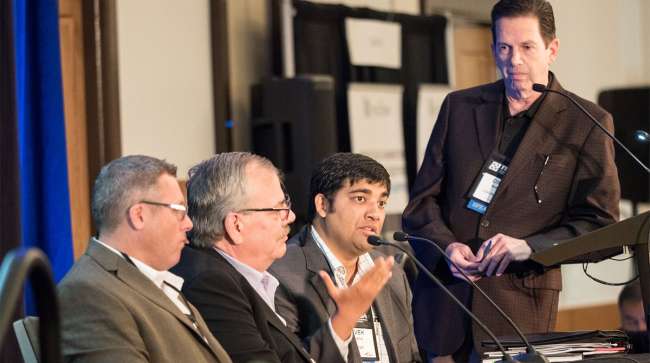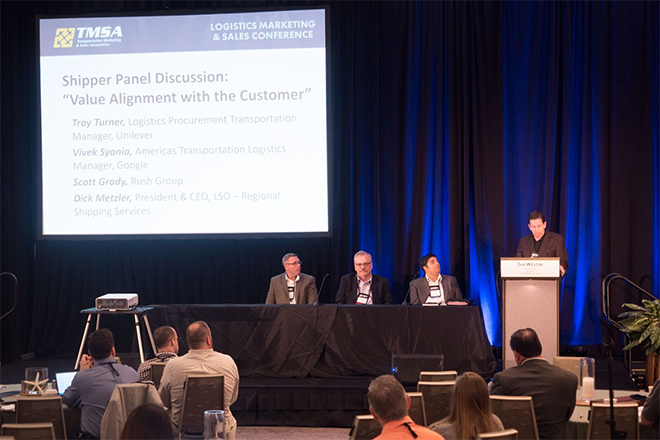Shippers Opt for Collaboration to Strengthen Supply Chains, TMSA Panelists Say

FORT MYERS, Fla. — Shippers are looking for collaborative transportation partners willing to understand their specific business challenges and work toward solving their current and future needs, a panel of experts said at a sales and marketing conference June 12.
“How do you help us become a better supply chain?” was the challenge Troy Turner, logistics procurement transportation manager at Unilever, posed to the audience at the Transportation Marketing and Sales Association’s Logistics Marketing & Sales Conference, held here June 11-13. “We’re really a marketing company at the end of the day. We rely on you to be the expert. We will often reach out to you and ask for your professional opinion on the best way to do things.”
Learning the intricacies of a shipper’s needs also is vital to building a successful relationship, so carriers must be willing to learn those details, said Vivek Syania, Americas transportation logistics manager for Google.

Moderator Dick Metzler, CEO of Regional Shipping Services, addresses the conference from the podium. (Joe Howard/Transport Topics)
“The way I see sales pitches today, they automatically assume that since we are a technology company that we will fall head over heels for every technology solution out there,” he said. “But our technology point of view is different from what you see with others. We are grappling with scale; we are expanding at a startup’s rate when we are one of the top five market caps in the world.”
He added, “Everybody can come in and propose a solution to a problem that we currently have, but very few can sit with us and look at the bigger picture three to five years out given the speed at which we are growing.”
Carriers also must be willing to discuss their specific capabilities, said Scott Grady, president of Rush Trucking Corp., which offers services that include shipment planning, load execution and logistics management, in addition to transportation services.
“It’s not coming in with a 25- to 30-minute sales pitch about everything in the industry,” he said. “Break it down. Are you used to doing that type of business? What kind of capacity do you have? Are the terminal locations close to where we have a need? We are looking at the data trying to get to the point that we’re vetting them before we get to the sales call.
“That 20-minute sales pitch of coming in and saying, ‘I can fix everything,’ doesn’t work as well as making sure you have the capacity, and the data available in the marketing materials. We do the research before we let someone come in.”
Grady added, “We look for a long-term partner and a long-term strategy. The value goes in both directions.”
Once a carrier is hired, proving that they can be a trusted partner can strengthen the relationship, Syania said. “We really have transparent collaboration,” he said. “We like our partners to be transparent with us, and in return we offer as much transparency as possible.”
Google also likes to learn from those partners, he added. “One of the things we look to our partners for is education,” Syania said. “To be honest, we spend a lot of our time catering to our customer’s goals, and less time understanding how the supply chain around the world is evolving.”
While he noted that Google has a subgroup that monitors and benchmarks industry trends, he acknowledged that people in the technology sector are “very short on the currency of what is out there in supply chain.”
Unilever recently hired someone exclusively to stay on top of emerging trends, Turner said, and added that the company also relies on its transportation partners to keep it up to speed.
“As our suppliers come in, we encourage [them] — as part of the agenda — to always go through a market update. Not only do we want a business update about how things are going with your organization but [also] what is going on with the market,” he said.
Turner pointed to the coverage the industry's transition to electronic logging devices has received as an example. "We were talking about it four years ago; we were already pursuing it and trying to understand where this was going," he said. "For a large company like ours, we need to be ahead of the curve. We cannot flex as quickly as other, smaller companies."
Beyond data, Unilever looks for companies that offer what Turner described as “ease of doing business.”
“This is one that is hard to measure prior to getting into the relationship,” he said. “It’s a very subjective measure. Are they there at the hour when you need them, or are they gone for the day? Are they our go-to carrier or are they not? Can you instant-message them? Can you text them? Call them on their cellphone?”
To gain visibility into these things, Turner said he’ll often ask for references — sometimes from other Unilever branches — to learn about a carrier’s on-time rate, responsiveness and more.
“All of the things you can measure are really easy,” he said. “It’s usually the subjective stuff that is hard to figure out, and that is where a lot conversations come into play.”

